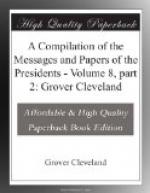The Senate at its last session, after full consideration, passed an act relating to this subject, which will now, I trust, commend itself to the approval of both Houses of Congress.
The clause of the Constitution upon which must depend any law regulating the Presidential succession presents also for solution other questions of paramount importance.
These questions relate to the proper interpretation of the phrase “inability to discharge the powers and duties of said office,” our organic law providing that when the President shall suffer from such inability the Presidential office shall devolve upon the Vice-President, who must himself under like circumstances give place to such officer as Congress may by law appoint to act as President.
I need not here set forth the numerous and interesting inquiries which are suggested by these words of the Constitution. They were fully stated in my first communication to Congress and have since been the subject of frequent deliberations in that body.
It is greatly to be hoped that these momentous questions will find speedy solution, lest emergencies may arise when longer delay will be impossible and any determination, albeit the wisest, may furnish cause for anxiety and alarm.
For the reasons fully stated in my last annual message I repeat my recommendation that Congress propose an amendment to that provision of the Constitution which prescribes the formalities for the enactment of laws, whereby, in respect to bills for the appropriation of public moneys, the Executive may be enabled, while giving his approval to particular items, to interpose his veto as to such others as do not commend themselves to his judgment.
The fourteenth amendment of the Constitution confers the rights of citizenship upon all persons born or naturalized in the United States and subject to the jurisdiction thereof. It was the special purpose of this amendment to insure to members of the colored race the full enjoyment of civil and political rights. Certain statutory provisions intended to secure the enforcement of those rights have been recently declared unconstitutional by the Supreme Court.
Any legislation whereby Congress may lawfully supplement the guaranties which the Constitution affords for the equal enjoyment by all the citizens of the United States of every right, privilege, and immunity of citizenship will receive my unhesitating approval.
CHESTER A. ARTHUR.
SPECIAL MESSAGES.
EXECUTIVE MANSION, December 10, 1883.
To the Senate and House of Representatives:
I transmit herewith a communication from the Secretary of the Interior of the 3d instant, submitting, with accompanying papers, draft of a bill to accept and ratify certain agreements made with the Sioux Indians and to grant a right of way to the Dakota Central Railway Company through the Sioux Reservation in Dakota.




